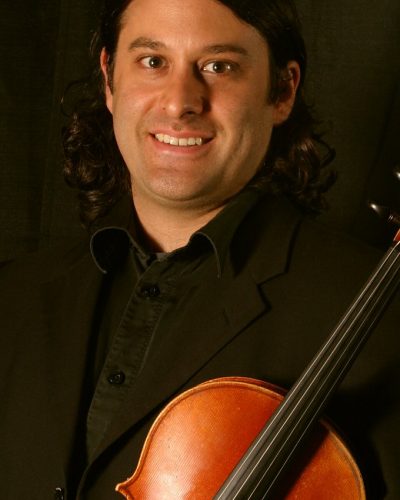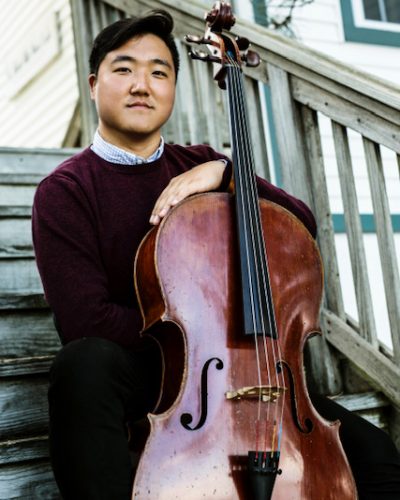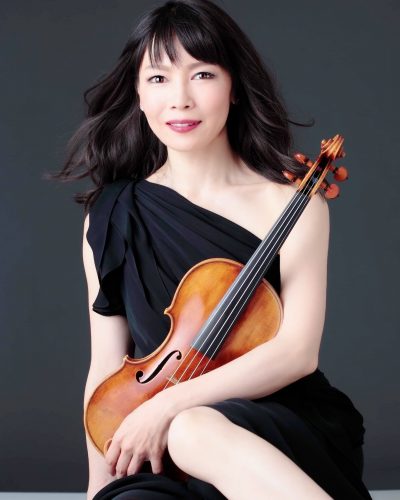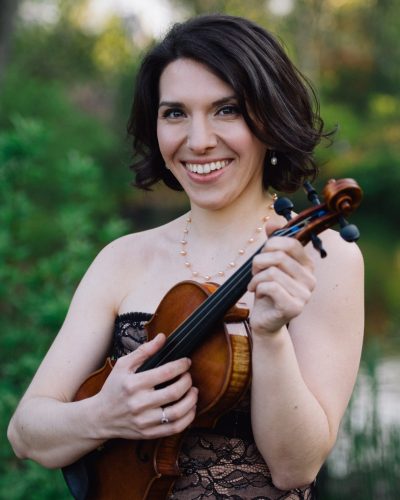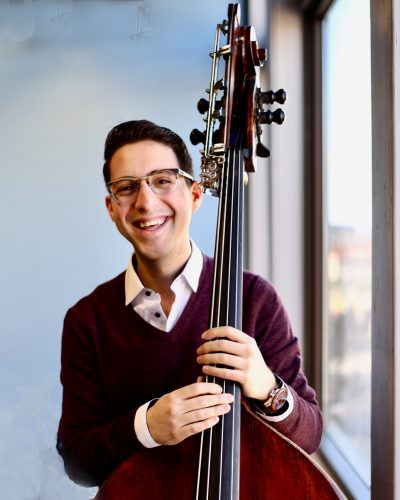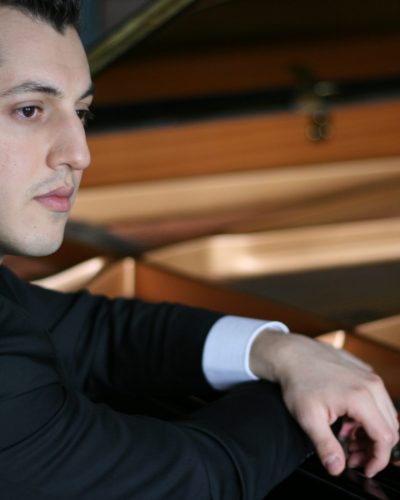Monira Foundation Virtual Stage Presents Pegasus: The Orchestra’s Fourth Season
THE TROUT – Chamber Series
Pegasus String Principals join forces with Karen Hakobyan at the piano to perform Schubert’s monumental Trout Quintet. The program will also feature Hakobyan’s thought-provoking composition for Piano Sextet “Cras, Es Noster” (Tomorrow, be ours).
*Stream Premiere Date – Saturday, July 24th, 2021 8:00 PM
*Will stay active for 2 weeks to subscribers, a link will be e-mailed after ticket purchase
*Stream Venue – YouTube
PROGRAM:
KARÉN HAKOBYAN Cras Es Noster (Tomorrow Be Ours) Op. 18
FRANZ SCHUBERT Quintet in A major for violin, viola, cello, double bass, and piano, op. 114, Trout
4. Andantino – Allegretto (D major)
PROGRAM NOTES:
KARÉN HAKOBYAN Cras Es Noster (Tomorrow Be Ours) Op. 18 for piano sextet Cras Es Noster is a complex composition based on a single motive which keeps transforming in unexpected and creative ways, much like the future it beseeches. The dark, brooding opening soon gives way to an awakening and then a sudden moment of awareness that the past we know does not have to be accepted as the designer of the future we don’t know. This is an eternal and uniquely human trait: the capacity to reimagine the future. Whether by evolution or revolution, this transformation reaches a transcending and spiritually uplifting resolution – for each and every individual and for humanity throughout our history – and within the short span of Cras Es Noster. Philosophically, Cras Es Noster displays Mr. Hakobyan’s belief that with enough determination we can help shape a better future. Technically, his intention is to showcase the versatility of the sextet by creating an illusion of a much larger force, such as an orchestra performing, thus breaking the boundaries between chamber and orchestral music.
SCHUBERT Quintet in A major for violin, viola, cello, double bass, and piano, op. 114, Trout
For all the popularity Schubert’s Trout Quintet has attained, it’s earliest years are shrouded in mystery. We know when Schubert wrote it, who commissioned it, and where it was finished, but for a decade thereafter the trail goes cold: neither the manuscript nor an account of its first performance have come down. And, until its publication in 1829, there’s little record of how it fared.
That’s not necessarily surprising, though. Schubert was wildly prolific, after all, and much of his music – especially the chamber works – were intended for private performances. That seems to have been the case with the beloved Trout.
It was requested by a certain Sylvester Paumgartner, a wealthy merchant from the town of Steyr (about 90 miles outside of Vienna) who was also a cellist of limited abilities and an enthusiastic music lover. His home in the village included a music room, a salon, and a well-stocked music library that apparently contained at least one Schubert song, his 1817 setting of Christian Schubart’s “Die Forelle” (“The Trout”), which Paumgartner requested be incorporated as a set of variations in a new quintet.
Schubert, who met Paumgartner while he was summering in Steyr in 1819, was also instructed to follow the instrumentation of a piano quintet (actually a quintet arrangement of a septet) by Johann Nepomuk Hummel of which his patron was a fan. Thus the omission of a second violin and the inclusion of a double bass, giving the Trout Quintet its distinctive sonority and making it one of only a small handful of major chamber works to feature that instrument.
The piece was begun during that summer of 1819 but not completed until the autumn, after Schubert had returned to Vienna. And this is where its history gets sketchy. The Trout may have been performed later that year in Steyr – or maybe not. What is known is that, by the time it was published a decade later, it was regarded by connoisseurs as being of the first rank. And it’s has retained that stature ever since.
It’s not hard to see why. Schubert’s writing in it is ebullient and unfailingly lyrical. The scoring is magnificently involved: every player in the ensemble shines, even the bass. Expressively, hardly a cloud darkens the music’s pages. The piece is, in essence, forty minutes of sheer, unbridled joy and great tunes, all of it brilliantly written. What’s not to love?
Unlike its four-movement Hummel model, the Trout Quintet features five movements. The first is cast in an expansive sonata form, though Schubert’s handling of its structure is freer and more rhapsodic than what one often encounters in the sonata-allegros of Haydn and Mozart.
A lyrical andante follows, featuring a number of surprising harmonic detours that anticipate the transcendent late piano sonatas and String Quintet. After this comes a blistering, exuberant Scherzo and then the famous variations on “Die Forelle.”
Each of the five variations are masterpieces of invention. The first three feature elaborations above and around the familiar tune (which is passed, respectively, from piano to viola to cello/bass). In the concluding pair, the music turns, first, to a furious, minor-key episode and, finally, wanders more leisurely through some fresh key areas. A forthright recapitulation of the lied closes everything out amiably.
The jovial spirit of “Die Forelle” isn’t far removed from the jaunty finale, which wraps the entire piece up in a burst of rhythmic energy and gloriously shifting tonal colors. It’s music that recalls the earlier movements and wraps up the whole piece, a reflection of one of the happiest summers of Schubert’s life, in an affectionate blaze.
© Jonathan Blumhofer
ARTIST BIOGRAPHIES:
Eiko Kano, violin
Praised as an artist with “electrifying intensity and lyrical expression” by Kyoto Newspaper and “mesmerizing interpreter” by Ongakuno-Tomo Magazine, Japanese violinist Eiko Kano is known for her sensational and dynamic performances. Eiko has a thriving international career as a soloist as well as a chamber musician frequently collaborating with distinguished artists such as principal oboist of the Berlin Philharmonic Albrecht Meyer, Eugene Drucker of the Emerson Quartet and Glenn Dicterow.
She is a top prizewinner of international competitions such as the 4th International Competition of Tokyo among others. As a result of winning the prestigious Forval Scholarship, Eiko was granted the Stradivarius “Reinville” violin. She serves as an assistant concertmaster in Albany Symphony Orchestra as well as regularly plays in the New York Philharmonic. Eiko is the concertmaster and senior artistic advisor of Pegasus: The Orchestra. Eiko has received BM and MM degrees from Manhattan School of Music and is a long-time resident of New York.
In 2016, she launched the critically acclaimed production titled “A Manhattan Story” with unique style of violin music with original storytelling. The first album “Winter” was released in 2017 followed by “Spring” in 2018: both being featured in the audio program on all international JAL flights. In 2018, Eiko founded a new ensemble, The New Yorkers, featuring Karén Hakobyan as her duo partner. Since then they have been performing extensively in USA and touring Japan.
As a recognition of her achievements, Eiko was loaned the precious “Wilhelmj” Stradivarius violin by Nippon Music Foundation. Her rare and mesmerizing video production of Bach Chaconne filmed in the prestigious Kyoto temple Zenrin-ji (Eikando) was featured in the Strad digital magazine in 2020. Eiko Kano was recently appointed as the music ambassador of the OIST Foundation. http://www.eikonyc.com
Stani Dimitrova, violin
Stanichka Dimitrova, whose playing has been described as “wonderfully full in tone and exuberant in performance” by the San Francisco Classical Voice, was a winner of the 2010 Concerto Competition at Stony Brook University, which resulted in a solo performance of the Sibelius Violin Concerto. She has also been a First Prize winner in the “Barbara Krakauer Scholarship Award” Competition at the Associated Music Teachers League in New York City, “Hopes, Talents, Masters” International Competition in Dobrich, Bulgaria, “Svetoslav Obretenov” National Competition in Provadia, Bulgaria, and was a Top Prize winner of the National Competition for Austrian and German Music in Burgas, Bulgaria. Ms. Dimitrova is a graduate from the Juilliard School, where she studied with Sally Thomas. She received her doctoral degree at Stony Brook University, studying with Philip Setzer, Pamela Frank, Soovin Kim and Philippe Graffin. In 2017 Stanichka made her Carnegie Hall solo debut in Weill Recital Hall under the auspices of St. Cyril and St. Methodious International Foundation.
She is founder and artistic director of PhiloSonia chamber music series, designed to create a personal connection between audience members and classical music. For more information visit: www.PhiloSonia.com Currently appointed as a Teaching Artist for the New York Philharmonic’s Philharmonic Schools Program, Stanichka participates in a variety of outreach activities and performances in public schools throughout New York.
William Hakim, viola
William Hakim has performed extensively throughout the United States and abroad. Praised for his “warmth of tone and musicality” (Leipziger Volkszeitung), he enjoys playing, writing and arranging music in many styles. He has recorded for Albany Records, Decca, and Nonesuch for various artists including Renee Fleming, served as Billy Joel’s violist for his Madison Square Garden residency, had numerous TV appearances with Josh Groban, toured the country with Branford Marsalis and the Chamber Orchestra of Philadelphia.
Mr Hakim is a member of the Iris Orchestra in Memphis and the le Poisson Rouge Ensemble as well as serving as principal of the New York Symphonic Ensemble and the Glens Falls Symphony. A former member of the Hyperion String Quartet, he studied with John Graham at the Eastman School of Music, Samuel Rhodes at Juilliard, and with Paul Neubauer at the Graduate Center of CUNY where he is pursuing a doctorate and researching improvisation methods for classically trained musicians. Mr. Hakim served on the faculty at Brevard Music Center and is on the faculty of Seton Hall University and Skidmore College.
Connor Kim, cello
Praised by the San Francisco Classical Voice as to having “one of the more vigorous and expressively varied performances… that I’ve heard”, cellist Connor Kim is quickly gaining wide- spread recognition as a humble musician. He quickly learned of his life passion at that young age, and amongst many awards he had earned, was a top prize-winner of the Schadt National Competition for Strings, Anton Rubinstein International Cello Competition, Menuhin-Dowling Young Artists Competition, and recipient of the Margaret Brady Study Grant at the Y.E.S. Foundation Competition, to name a few. Connor debuted with the Fremont Symphony Orchestra after winning first prize at the Young Artist Competition, and was invited to perform Dvorak Cello Concerto at their 50th Anniversary Gala under the baton of Maestro Greg Sudmeier.
A passionate chamber musician, Kim has participated in various chamber music festivals and has shared stages with many respectable musicians. He has attended the Hotchkiss Summer Portals Chamber Music Program, where he worked with members of the Brentano, Shanghai, Miami, and Miro Quartets, and was re-invited to attend for three years in a row, upon which his last year, was fortunate enough to solo alongside violinist Ida Kavafian in Astor Piazzola’s Otoño Porteno. He also participated in Yellow Barn’s Young Artist Program, Kneisel Hall, International Masterclass Series Prussia Cove of the UK, the Perlman Music Program Chamber Music Workshop, and was most recently an International Program participant at Music@Menlo. He was also invited to participate in the Winter Residency for Music@Menlo in 2019. This summer, he will be attending Ravinia’s Steans Music Institute. Throughout the various programs, Connor has had the chance to perform with world- renowned artists such as Itzakh Perlman, Hsin-Yun Huang, Roger Tapping, Vivian Hornik Weilerstein, and more. Kim is currently a member of the Kila Quartet, and as a group, they are members of the Juilliard Honors Chamber Music Program, where they were given the opportunity to debut at Lincoln Center’s Alice Tully Hall amongst many other engagements. Connor has received both his Bachelors and Masters Degrees at The Juilliard School under the tutelage of Joel Krosnick and Timothy Eddy with a full tuition scholarship as an Irene Diamond Graduate Fellow, and through the generosity of the George L. Shields Memorial Scholarship and Mari Brown Scholarship. He currently plays a Becker cello generously on loan from the Colburn Foundation.
Milad Daniari, contrabass
Bassist Milad Daniari maintains a dynamic career in NYC as a musician with orchestras on the East Coast including the American Ballet Theatre, Albany Symphony, and the Vermont Symphony in addition to serving as Principal Bass with Pegasus: The Orchestra. Milad regularly performs at major venues including Carnegie Hall, the David H. Koch Theater, the Metropolitan Opera House, Alice Tully Hall, Jazz at Lincoln Center, and the Metropolitan Museum of Art. Previously, he served as Co-Principal Bass with The Orchestra Now. He has served as Principal Bass with the Chesapeake Orchestra and appeared in performance with the Shreveport Symphony. Milad currently serves as the Double Bass Instructor at The Browning School in NYC. As a chamber musician, Milad has appeared at the Roxbury Arts Group, at the National Opera Center in the world premiere of Martin Hennessy’s monologue operas in 2019, and in workshop with Decoda, the affiliate ensemble of Carnegie Hall, leading students of the New York Youth Symphony. Milad’s festival appearances include Co-Principal Bass at the National Repertory Orchestra as well as the Round Top Festival Institute, Colorado College Summer Music Festival, Bard Music Festival, Grafenegg Academy, and the Alba Music Festival. A recipient of the Ambrose Monell Foundation Scholarship, Milad received his Bachelor of Music from Manhattan School of Music as a student of New York Philharmonic Principal Bass Timothy Cobb. He attained his Master of Music from Bard College.
Karén Hakobyan, piano
Described as “a musician of abundant gifts and bountiful ideas” by New York Concert Review, and “an immensely talented and dynamic performer” by Deseret Morning News, Armenian American pianist, composer, and conductor Karén Hakobyan is a versatile force on the international music scene. Since his Carnegie Hall debut at the age of seventeen, he has performed in major concert halls in Armenia, Argentina, Mexico, Germany, UK, Belgium, France, Japan, and the US. Karén regularly appears in prestigious festivals and concert series. Some of his festival performance highlights include: the “Lille International Piano(s) Festival” in 2005 (Lille, France), “The Pianist as Composer” Festival in 2008 (New York), Keys to the Future” Contemporary Music Festival in 2009-2010 (New York), the Gina Bachauer International Festival in 2015 (Utah), Festival Musique d’Abord in 2017 (Barbizon, France) and the Philip Lorenz International Keyboard Concerts in 2018 (California).
He is a top prizewinner of multiple international piano and composition competitions and holds degrees from the Manhattan School of Music, Mannes College of Music, and the University of Utah. Karén has appeared as a soloist with major orchestras across several continents. His performances have been broadcasted on WQXR Radio (New York City), WMFT Radio (Chicago), WSKG Radio (New York), Argentine National Radio, Monterrey’s (Mexico) Op. 102 station, Armenian National Radio, Al Jazeera TV, Public TV of Armenia and Voice of America TV (International).
He is the Founder, Principal Conductor and Artistic Director of Pegasus: the Orchestra, based in New York. www.karenhakobyan.com


